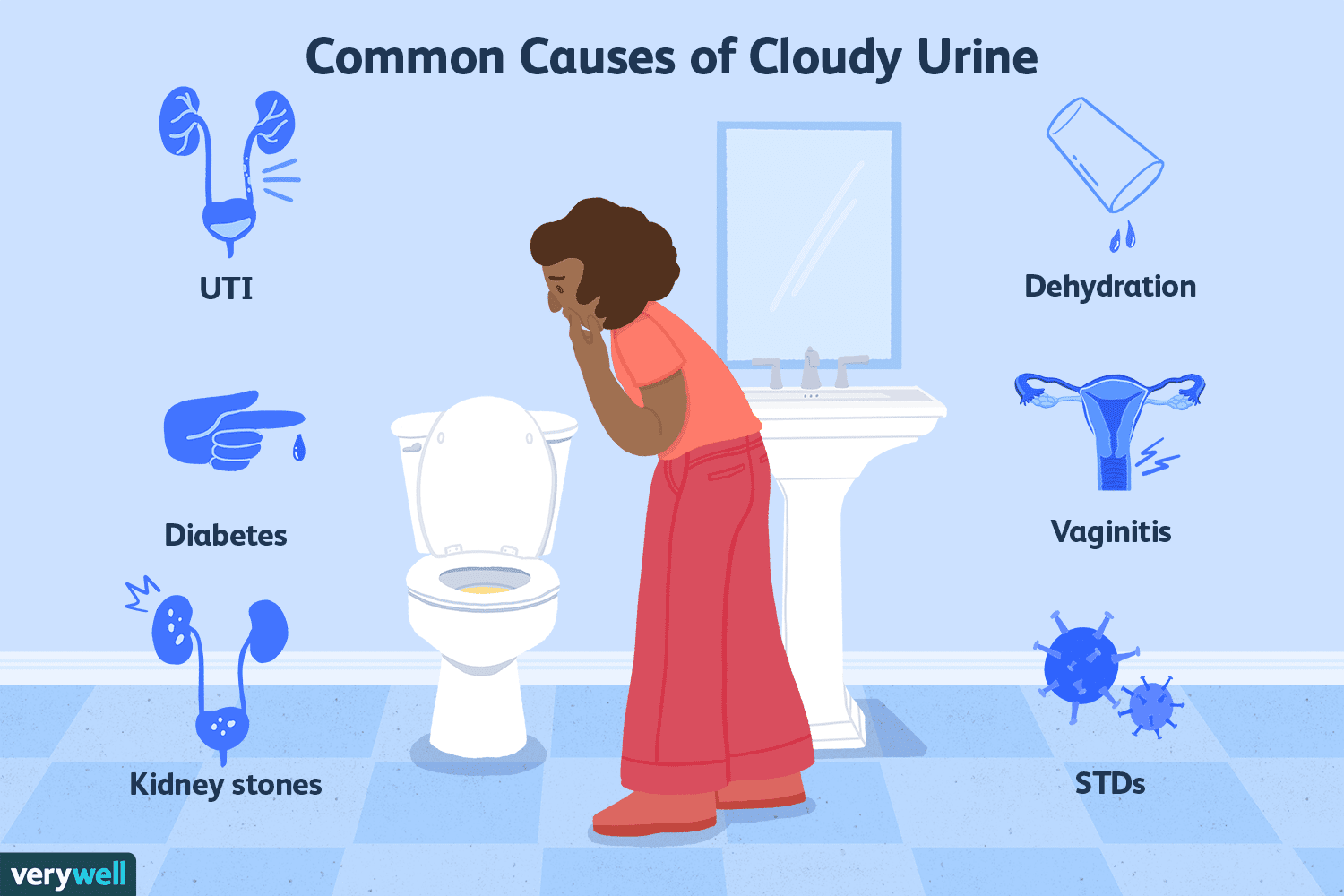11 natural treatments for cloudy urine
 |
The color of urine has been a valuable diagnostic tool since the beginning of medicine, as it reveals important information about your health.
There are many possible cloudy urine causes. Cloudy urine may be a sign of a urinary tract infection, dehydration, kidney stones, sexually transmitted diseases or other health conditions.
If you have cloudy urine no other symptoms then you may be dehydrated.
If you have cloudy pee, discomfort or pain around the bladder, a need to urinate frequently and urgently, and a feeling that your bladder is never empty, you may have a bladder infection.
Some natural remedies to help clear up cloudy urine and prevent a UTI include probiotics, cranberry, acupuncture and good hygiene, especially after sexual intercourse.
http://vietnamfriendship.vn/Is-cloudy-urine-dangerous-07-26176.html
Natural treatments for cloudy urine
Cloudy urine is commonly caused by an infection, which may be treated with antibiotics. However, continued use of antibiotics has caused the development of antibiotic resistance, which has become a serious health concern. Certain home remedies for UTIs, which can lead to cloudy smelly urine, help to boost your immune system and flush out harmful bacteria.
If you’re wondering, how do I get rid of cloudy urine? Some natural treatments to clear up clouding of the urine and prevent a UTI include probiotics, cranberry, acupuncture and more. Let’s take a look at these natural cloudy urine treatment options now!
 |
1. L-arginine
L-arginine is a type of amino acid that helps with detoxification and fights inflammation. It also has antibacterial and immune-modulating properties.
L-arginine can play an important role in treating an overreactive bladder because it helps regulate and regenerate bladder cells. When L-arginine is converted into nitric oxide, it can also inhibit the growth of different microorganisms that may cause UTIs and symptoms like cloudy urine.
2. Probiotics
A UTI is caused by bacteria that colonize in the urinary tract. Probiotics are used to help repopulate the normal flora of the GI tract. They aid the gastrointestinal tract or vagina to resist invasion and adhesion of pathogens like E. coli, enhance the immune system, increase the population of good bacteria, and regulate the intestinal flora.
3. Quercetin
Quercetin is a type of flavonoid antioxidant that plays a key role in fighting inflammation. While you can get plenty of quercetin from eating a healthy diet with foods, such as leafy greens, berries and broccoli, some people also take quercetin supplements for their strong anti-inflammatory effects.
Quercetin can help regulate inflammation in the bladder, and it lowers pain associated with infections. Research shows that people experiencing bladder pains from infections, which cause cloudy urine, an urgent need to urinate, inflammation and burning, have fewer symptoms when taking quercetin supplements.
4. Parsley
Derived from the petroselinum plant, parsley has been used as a natural detox remedy and anti-inflammatory agent. Parsley extract has shown to possess diuretic effects in addition to anti-inflammatory properties, which are essential in the treatment of UTIs.
5. Garlic
Garlic is well-known for its antibacterial, antifungal and antiviral properties, which are attributed to the presence of allicin. Garlic also exhibits anti-inflammatory, antioxidant and immune-boosting effects that aid in the treatment of urinary tract infections that can cause cloudy urine. Research suggests that the combination of garlic oil and parsley in pill form can inhibit bacterial growth and reproduction.
6. Cranberries
Some research suggests that cranberry consumption demonstrates a decrease in UTI recurrence over a period of six months. A 2014 study published in Clinical Infectious Diseases found that cranberry prophylaxis was effective in improving quality of life in patients with a urinary tract infection, and it was more cost-effective than antibiotics.
7. Avoid Foods that Exacerbate Symptoms
A study published in the British Journal of Urology found that after patients filled out three-day food and voiding diaries, they revealed that the intake of certain foods and fluids exacerbated UTI symptoms and increased painful bladder symptoms within two to four hours of consumption.
The symptoms were reduced with the elimination of these common problematic foods: alcoholic beverages, carbonated drinks, caffeine, spicy foods, tomatoes, citrus fruits and vinegar. Arylalkylamine-containing foods, such as bananas, beer, cheese, mayonnaise, nuts, onions, raisins, sour cream, wine and yogurt, have also shown to increase symptoms of a possible bladder infection. So it’s a good idea to avoid these foods that cause cloudy urine and other unwanted symptoms.
 |
8. Drink Plenty of Water
According to research published in the European Journal of Clinical Nutrition, bacterial destruction from the urinary tract is partially dependent on urine flow and voiding frequency. Studies show that chronic low fluid intake may play a crucial role in the pathologies of urinary tract infections and other diseases of the urinary system (like bladder cancer and kidney disease).
Adequate hydration is important and may improve the results of antimicrobial therapy for UTIs. Also, it’s important to urinate frequently to help flush bacteria from the bladder. Holding urine for a long time allows bacteria to multiply within the urinary tract, resulting in UTIs like cystitis.
9. Acupuncture
A 2002 study published in the American Public Health Association indicated that acupuncture reduced the cystitis recurrence rate among cystitis-prone women to half the rate among untreated women. Also, women in the acupuncture group exhibited reductions in residual urine, which is a risk factor in the pathogenesis of recurrent lower UTIs among postmenopausal women and maybe even among adult women in general.
10. Preventive Measures Related to Sexual Intercourse
Research published in the Sultan Qaboos University Medical Journal shows that preventive measures related to sexual intercourse may reduce the UTI recurrence rate. Women are encouraged to clean the genital areas before and after sex and to wipe from front to back, which helps reduce the spread of E. coli from the perigenital area to the urethra.
Avoiding multiple sexual partners reduces the risk of both UTIs and sexually transmitted infections. Women are also encouraged to avoid spermicidal contraceptives, diaphragms and vaginal douching, which may irritate the vagina and urethra and encourage the entry and colonization of bacteria within the urinary tract.
11. Avoid Common Skin Allergens
A study conducted at the University of Michigan School of Public Health found that it’s best to avoid skin allergens on or around the genital area, such as bubble bath liquids, bath oils, vaginal creams and lotions, deodorant sprays or soaps. Many of these contain toxic synthetic scents. These products can alter vaginal flora and ultimately result in UTIs and symptoms like cloudy urine.
Cloudy Urine Precautions
Although cloudy or murky urine does not always mean you have a serious health problem, if you notice that the cloudy or murky color lasts for several days, even after you’ve tried some home remedies to reverse the issue, it’s a good idea to reach out to your health care provider.
Some medical conditions that cause clouding of the urine, like sexually transmitted diseases or kidney problems, shouldn’t be ignored, and they typically won’t go away on their own. Only a proper urinalysis that’s taken at a medical lab or doctor’s office can accurately diagnose potential medical conditions./.
( Christine Ruggeri )
Recommended
 Handbook
Handbook
Vietnam Moves Up 8 Places In World Happiness Index
 Handbook
Handbook
Travelling Vietnam Through French Artist's Children Book
 Multimedia
Multimedia
Vietnamese Turmeric Fish among Best Asian Dishes: TasteAtlas
 Handbook
Handbook
From Lost to Found: German Tourist Thanks Vietnamese Police for Returning His Bag
 Handbook
Handbook
Prediction and Resolution for the Disasters of Humanity
 Handbook
Handbook
16 French Films To Be Shown For Free During Tet Holiday In Vietnam
 Handbook
Handbook
Unique Cultural and Religious Activities to Welcome Year of the Snake
 Handbook
Handbook
